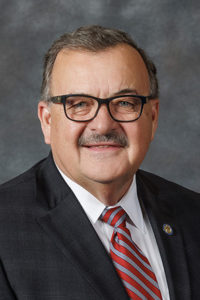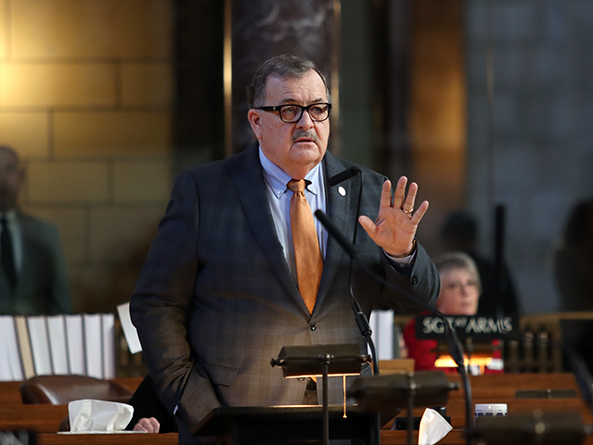Two-person train crew requirement stalls on first round
A bill intended to improve train safety in Nebraska stalled on general file Feb. 2 after a failed cloture motion.

Under LB31, introduced by North Platte Sen. Mike Jacobson, a train or light engine used in connection with the movement of freight would be required to be operated with a crew of at least two individuals.
As introduced, the crew requirement would not apply to trains or light engines operated by utility employees, during hostler or helper service or for the purpose of loading or unloading freight or grain so long as the train is not moving faster than 10 miles per hour.
A Transportation and Telecommunications Committee amendment, adopted 35-8, would eliminate the speed restriction and exempt Class III rail carriers from the two-person crew requirement.
Jacobson said the increasing number of railroad accidents in Nebraska demonstrates the need for two-person train crews. Congress and the Federal Railroad Administration so far have declined to set a minimum crew size standard, he said, although 11 states including Colorado and Kansas require two-person crews.
Jacobson said a second crew member can render aid after a collision with vehicles at a crossing, notify first responders of any hazardous materials on a train’s manifest and provide an “extra set of eyes” to an engineer, who must remain in the cab at all times.
“The statistics are pretty clear on the number of accidents that … continue to happen,” he said. “There are safety concerns that are not being addressed.”
Sen. Carolyn Bosn of Lincoln said she has seen no evidence that trains with two crew members are safer than those with only one.
Bosn and several of the bill’s opponents said LB31 would contribute to a “patchwork” of state regulations governing train crew size, complicating railroad operations and potentially conflicting with federal regulations.
Bosn said she did not vote to advance the bill from committee because federal regulators are expected to publish a crew size standard next month. Conflicting state and federal rules would lead to lawsuits, she said, adding that regulation of freight trains generally is left to the federal government.
Sen. Danielle Conrad of Lincoln, who supported the bill, said the question of federal preemption is not straightforward. She said the belief that federal action is imminent is “illusory at best” and that lawmakers should not abdicate their responsibility to ensure the safety of rail workers and the public in the meantime.
“When there is … room for states to act, they can and they should,” Conrad said. “I would contend that we have that flexibility … in regards to this issue now.”
Columbus Sen. Mike Moser, chairperson of the committee, opposed the bill, saying train crew size should be negotiated by railroads and labor unions.
“I don’t think any business likes being told how to run their business,” he said. “They know more about it than we do.”
Sen. Lou Ann Linehan of Elkhorn agreed, saying Union Pacific and its workers recently agreed to a two-year contract requiring trains to operate with two-person crews.
“I don’t understand why we’re interjecting ourselves into a subject that is a negotiation between the unions and management,” she said.
After eight hours of first-round debate, Jacobson filed a motion to invoke cloture, which ceases debate and forces a vote on the bill and any pending amendments.
The motion failed on a vote of 24-19. Thirty-three votes were needed.
A failed cloture motion results in debate on a proposal ceasing for the day. LB31 is unlikely to be placed on the agenda again this session.


